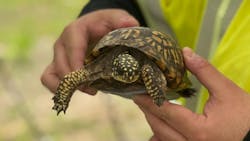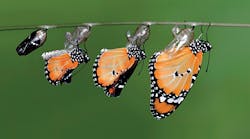Utility Crews Train to Protect Turtles in Rights-of-Way During Annual Habitat Program
In a unique blend of conservation and grid maintenance, electric utility professionals gathered this week in Agawam, Massachusetts, to participate in an annual training focused on protecting endangered turtles living in utility rights-of-way.
Hosted by Eversource and supported by the Massachusetts Division of Fisheries and Wildlife, the hands-on event trained dozens of utility vegetation management staff and contractors in identifying and safely relocating species such as the Eastern Box Turtle prior to mowing or other field operations. The effort is part of a broader initiative to balance grid reliability with environmental stewardship.
With guidance from wildlife biologists and even a turtle-detection dog, the team successfully located and relocated 17 turtles just a few hundred feet from active work zones, ensuring their safety while maintaining vegetation around transmission infrastructure.
"Vegetation management within rights-of-way can actually help preserve habitats for many rare species," said Jesse Leddick, Assistant Director of MassWildlife’s Natural Heritage and Endangered Species Program. “This kind of training ensures field crews are equipped to support conservation goals while doing critical utility work.”
These efforts reflect a growing recognition across the industry that ecological care and electric reliability can—and should—coexist, especially in utility corridors that intersect with sensitive wildlife zones.


